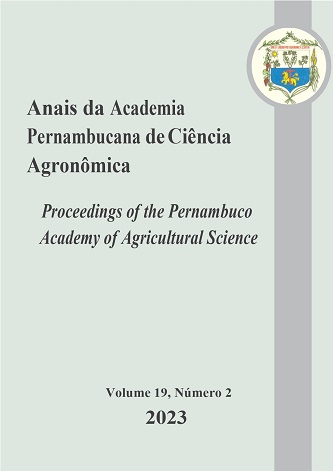SUBSTRATES FOR THE PRODUCTION OF ENTOMOPATHOGENIC ISOLATES OF Fusarium caatingaense TO CONTROL Dactylopius opuntiae
Palabras clave:
Biological control, conidia production and viability, mass production, vegetable substratesResumen
Opuntia ficus-indica (prickly pear) is used as a source of animal feed in Northeast Brazil. Its yield has been severely affected by insect pest Dactylopius opuntiae (cochineal scale). Fusarium caatingaense isolates have been reported to be effective in controlling this pest. Therefore, this study aimed to select substrates for the production of F. caatingaense. Conidia production and viability of five F. caatingaense isolates were evaluated on six substrates: rice, sugarcane bagasse, sugarcane bagasse + 0.66% w/v peptone, corn grains, corn grains + 0.66% w/v peptone, and sweet corn grains. Rice and corn were the best substrates for the production of most isolates. Isolate URM 6778 was selected for the analyses of sporulation, germination, and pathogenicity after storage in these substrates at 4 ºC and 28 ºC and periods of 0, 15, 30, and 60 days. Corn was the best substrate for the fungus and 4 ºC was the most suitable storage temperature. The highest conidia concentration was observed on the 30th day of storage, with a decrease on the 60th day. Conidia remained viable in all periods analyzed, except on the 60th day at 28 ºC. Pathogenicity against D. opuntiae was kept until 30 days of storage.Descargas
Citas
ALVES, S.B. Fungos entomopatogênicos. In ALVES, S.B. Controle Microbiano de Insetos. 2. ed. Piracicaba: Fundação de Estudos Agrários Luiz de Queiroz, 1998. cap. 11, p. 289-370.
CANTERI, M.G.; ALTHAUS, R.A.; VIRGENS FILHO, J.S.; GIGLIOTI, E.A.; GODOY, C.V. SASMAgri: Sistema para a análise e separação de médias em experimentos agrícolas pelos métodos Scoft-Knott, Tukey e Ducan. Revista Brasileira de Agrocomputação, v. 1, p. 18-24, 2001.
CARNEIRO-LEÃO, M.P.; TIAGO, P.V.; MEDEIROS, L.V.; COSTA, A.F.; OLIVEIRA, N.T. Dactylopius opuntiae: Control by the Fusarium incarnatum–equiseti species complex and confirmation of mortality by DNA fingerprinting. Journal of Pest Science, v. 90, n. 3, p. 925-933, 2017. DOI: 10.1007/s10340-017-0841-4
DINIZ, A.G.; BARBOSA, L.F.S.; SANTOS, A.C.S.; OLIVEIRA, N.T.; COSTA, A.F.; CARNEIRO-LEÃO, M.P.; TIAGO, P.V. Bio-insecticide effect of isolates of Fusarium caatingaense (Sordariomycetes: Hypocreales) combined to botanical extracts against Dactylopius opuntiae (Hemiptera: Dactylopiidae). Biocontrol Science and Technology, v. 30, n. 4, p. 384-395, 2020. DOI: 10.1080/09583157.2020.1720601
DINIZ, A.G.; CERQUEIRA, L.V.B.M.P.D.; RIBEIRO, T.K.D.O.; COSTA, A.F.; TIAGO, P.V. Pathogenicity of isolates of Fusarium incarnatum-equiseti species complex to Nasutitermes corniger (Blattodea: Termitidae) and Spodoptera frugiperda (Lepidoptera: Noctuidae). International Journal of Pest Management, p. 1-10, 2021. DOI: 10.1080/09670874.2020.1797232
LIMA, I.J.; CARNEIRO LEÃO, M.P.; SANTOS, A.C.S.; COSTA, A.F.; TIAGO, P.V. Production of conidia by entomopathogenic isolates of Fusarium caatingaense on different vegetable substrates. Biocontrol Science and Technology, v. 31, n. 2, p. 206-218, 2020. DOI: 10.1080/09583157.2020.1843599
JARONSKI, S.T.; MASCARIN, G.M. Mass production of fungal entomopathogens. In: LACEY, L. A. Microbial control of insect and mite pests. 1 ed. Yakima: Academic Press of Elsevier Inc., 2017. Cap 9, p. 141-155.
LOUREIRO, E.S.; BATISTA FILHO, A.; LEITE, L.G.; ALMEIDA, J.E.M. Viabilidade de conídios e blastósporos de Sporothrix insectorum (Hoog & Evans) armazenados em diferentes temperaturas. Arquivos do Instituto Biológico, v. 70, p. 89-89, 2003.
MACIEL, M.H.C.; AMARAL, A.C.; SILVA, T.D., BEZERRA, J.D.; SOUZA-MOTTA, C.M.; COSTA, A.F.; TIAGO, P.V.; OLIVEIRA, N.T. Evaluation of Mycotoxin Production and Phytopathogenicity of the Entomopathogenic Fungi Fusarium caatingaense and F. pernambucanum from Brazil. Current Microbiology, v. 78, n. 4, p. 1218-1226, 2021. DOI: 10.1007/s00284-021-02387-y
MAR, T.T.; LUMYONG, S. Conidial production of entomopathogenic fungi in solid state fermentation. KKU Research Journal, v. 17, p. 762-768, 2012.
MARQUES, J.E.; ALVES, S.B.; MARQUES, I.M.R. Virulência da Beauveria bassiana (Bals) Vuill. a Diatracea saccharalis (F) (Lepdoptera: Cambidae) após armazenamento de conídios em baixa temperatura. Anais da Sociedade Entomológica do Brasil, v. 29, n. 2, p. 303-307, 2000. DOI: 10.1590/S0301-80592000000200012
MASCARIN, G.M., LOPES, R.B., DELALIBERA JR, Í., FERNANDES, É.K.K., LUZ, C., FARIA, M. Current status and perspectives of fungal entomopathogens used for microbial control of arthropod pests in Brazil. Journal of Invertebrate Pathology, v. 165, p. 46-53, 2019. DOI: 10.1016/j.jip.2018.01.001
PRASAD, C.S.; PAL, R. Mass Production and Economics of Entomopathogenic Fungus, Beauveria bassiana, Metarhizium anisopliae and Verticillium lecanii on agricultural and industrial waste. Scholars Journal of Agriculture and Veterinary Sciences, v. 1, n. 1, p. 28-32, 2014.
PÜNTENER, W. Manual for field trials in plant protection. 2. ed. Basle: Ciba-Geigy, 1981. 205p.
SANTA, H.S.D.; SANTA, O.R.D.; BRAND, D.; VANDENBERGHE, L.P.D.S.; SOCCOL, C.R. Spore production of Beauveria bassiana from agro-industrial residues. Brazilian Archives of Biology and Technology, v. 48(SPE), p. 51-60, 2005. DOI: 10.1590/S1516-89132005000400007
SANTOS, A.C.S.; DINIZ, A.G.; TIAGO, P.V.; OLIVEIRA, N.T. Entomopathogenic Fusarium species: A review of their potential for the biological control of insects, implications and prospects. Fungal Biology Reviews, v. 34, n. 1, p. 41-57, 2020. DOI: 10.1016/j.fbr.2019.12.002
SANTOS, A.C.S.; OLIVEIRA, R.S.L.; COSTA, A.F.; TIAGO, P.V.; OLIVEIRA, N.T. Controlling Dactylopius opuntiae with Fusarium incarnatum–equiseti species complex and extracts of Ricinus communis and Poincianella pyramidalis. Journal of Pest Science, v. 89, n. 2, p. 539-547, 2016. DOI: 10.1007/s10340-015-0689-4
SANTOS, A.C.S.; TRINDADE, J.V.C.; LIMA, C.S.; BARBOSA, R.N.; COSTA, A.F.; TIAGO, P.V.; OLIVEIRA, N.T. Morphology, phylogeny and sexual stage of Fusarium caatingaense and Fusarium pernambucanum, new species of the Fusarium incarnatum-equiseti species complex associated with insects in Brazil. Mycologia, v. 111, n. 2, p. 244-259, 2019. DOI: 10.1080/00275514.2019.1573047
SHI, Y.; XU, X.; ZHU, Y. Optimization of Verticillium lecanii spore production in solid-state fermentation on sugarcane bagasse. Applied Microbiology and Biotechnology, v. 82, n. 5, p. 921, 2009. DOI: 10.1007/s00253-009-1874-2
VELEZ, B.A.A.; DINIZ, A.G.; BARBOSA, L.F.S.; SANTOS, A.C.S.; COSTA, A.F.; TIAGO, P.V. Potential of Fusarium incarnatum-equiseti species complex isolates with Chenopodium ambrosioides and Enterolobium contortisiliquum extracts to control Dactylopius opuntiae. International Journal of Tropical Insect Science, v. 39, n. 2, p. 131-138, 2019. DOI: 10.1007/s42690-019-00014-9
Descargas
Publicado
Versiones
- 2023-02-07 (3)
- 2023-02-07 (2)
- 2023-02-07 (1)
Cómo citar
Número
Sección
Licencia
Derechos de autor 2023 Anais da Academia Pernambucana de Ciência Agronômica

Esta obra está bajo una licencia internacional Creative Commons Atribución-NoComercial-CompartirIgual 4.0.








